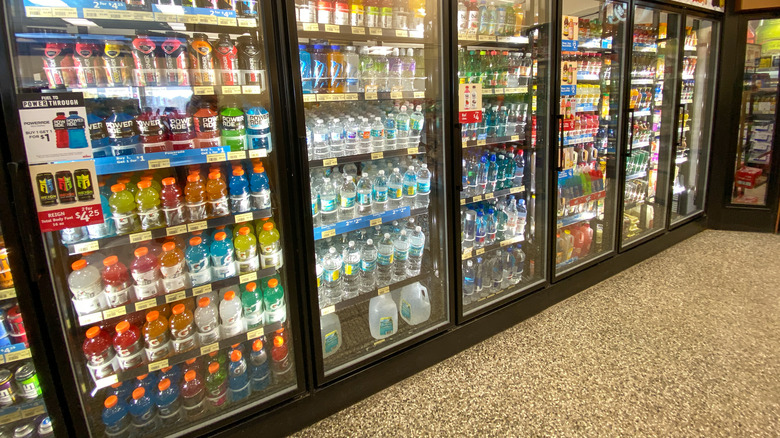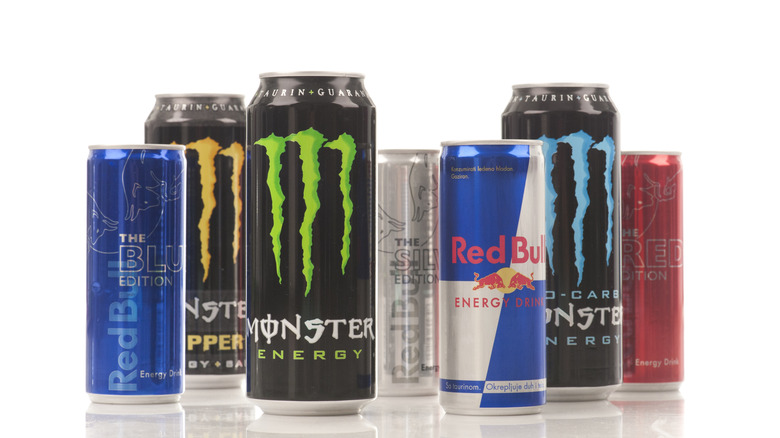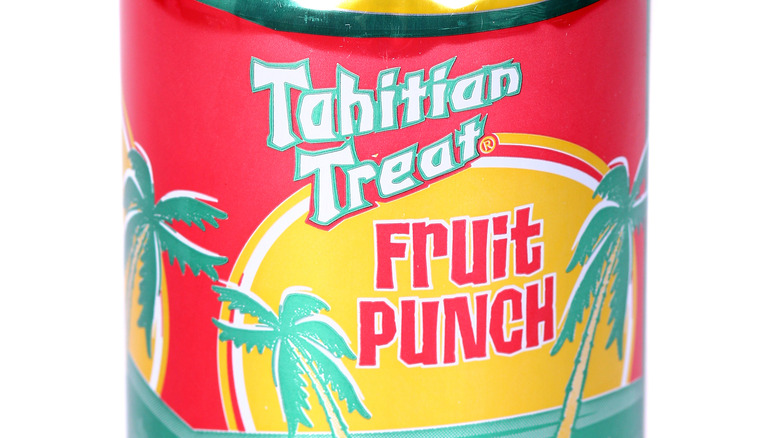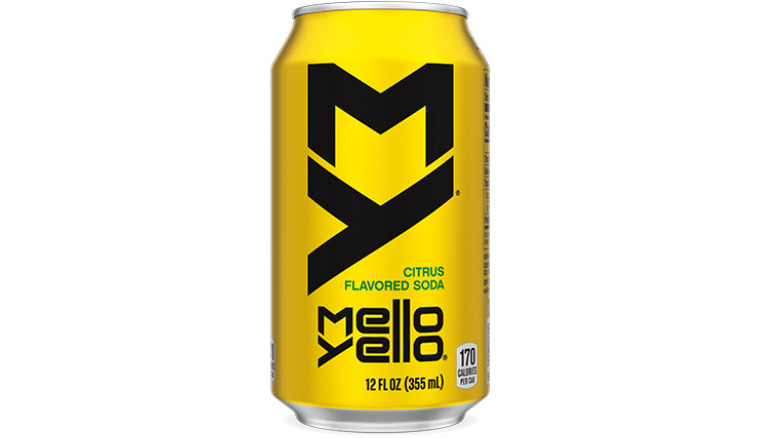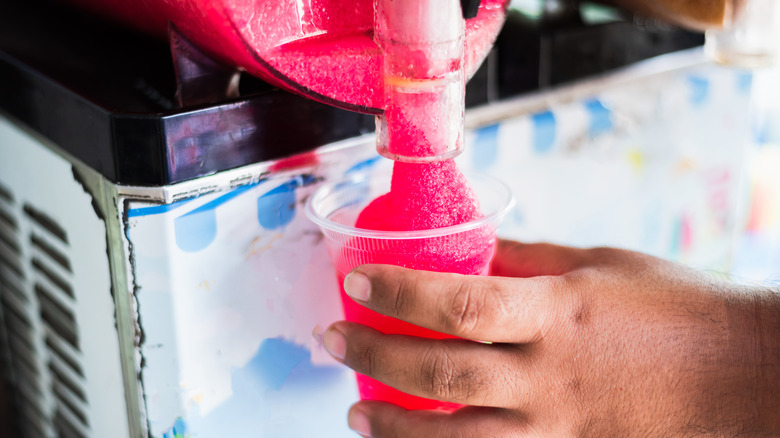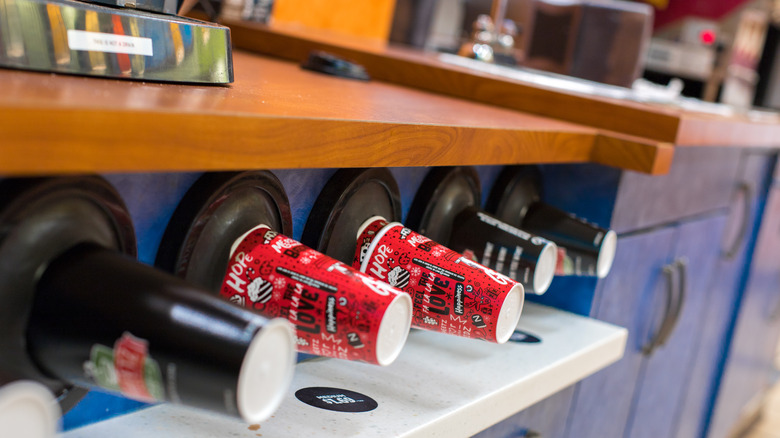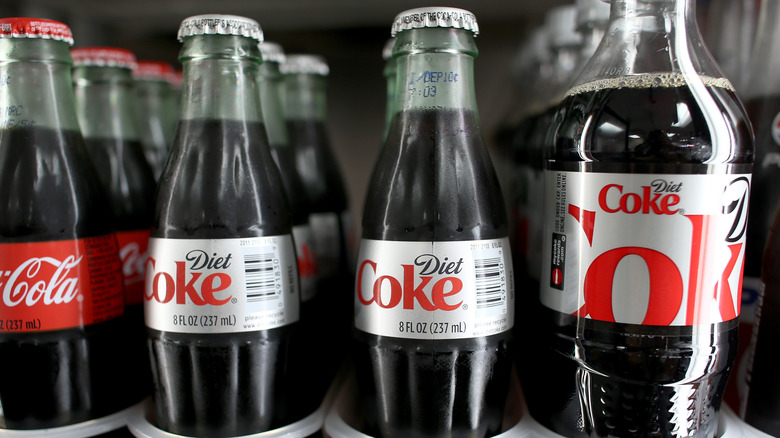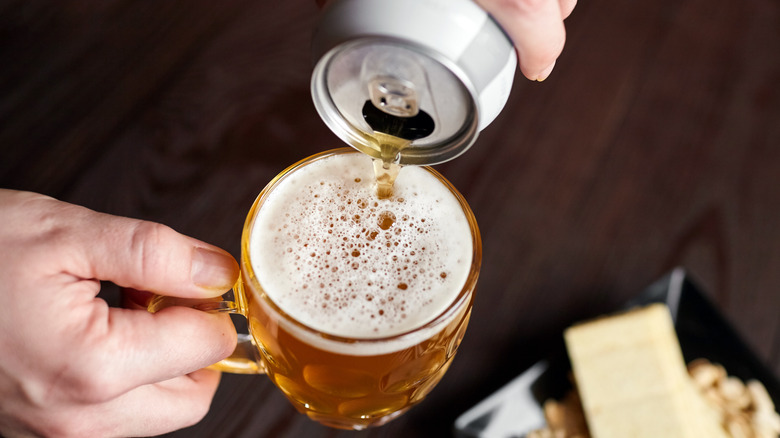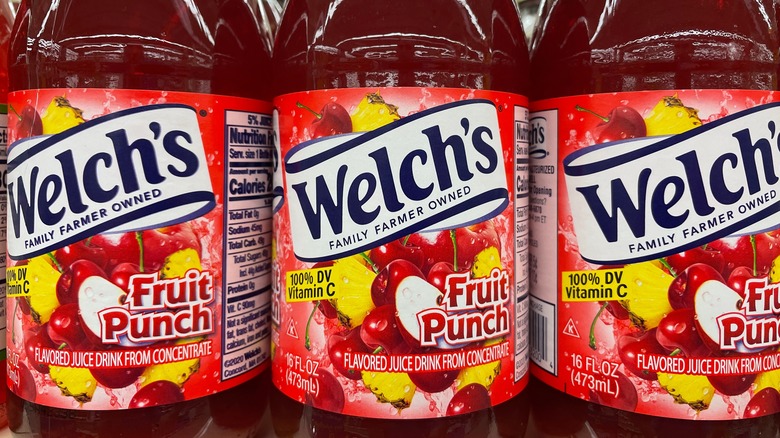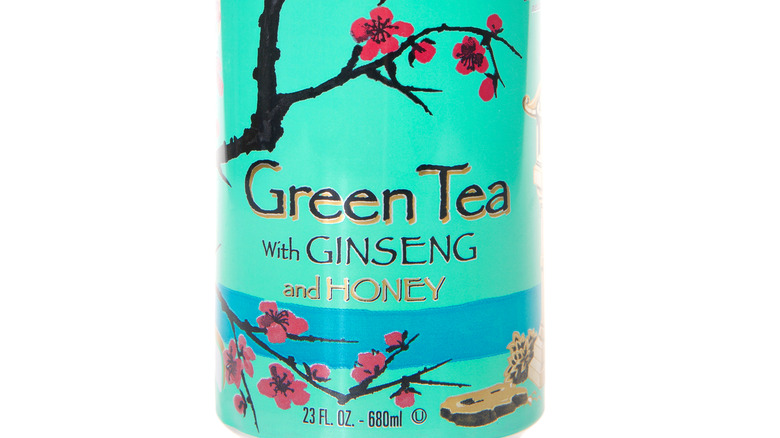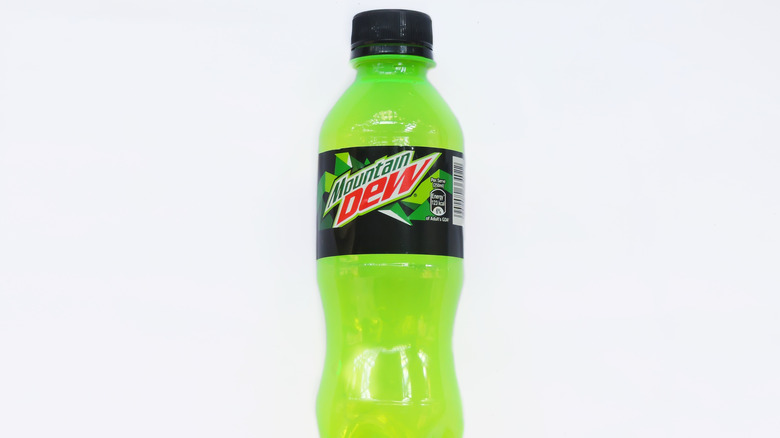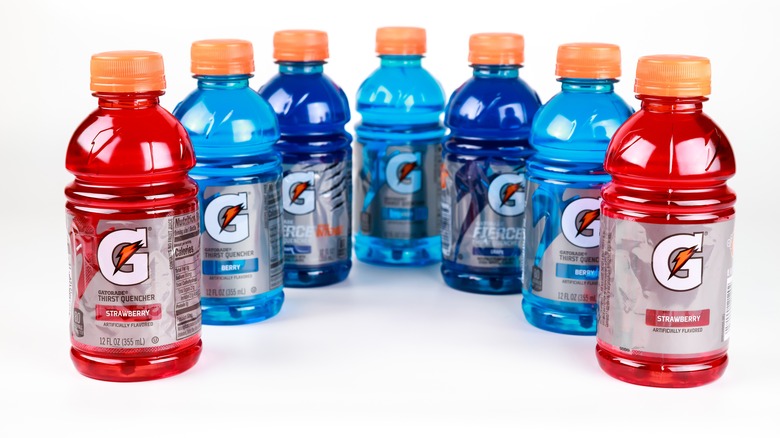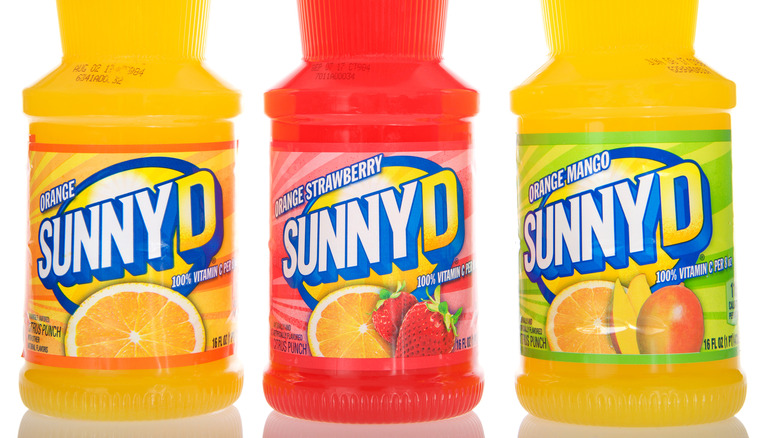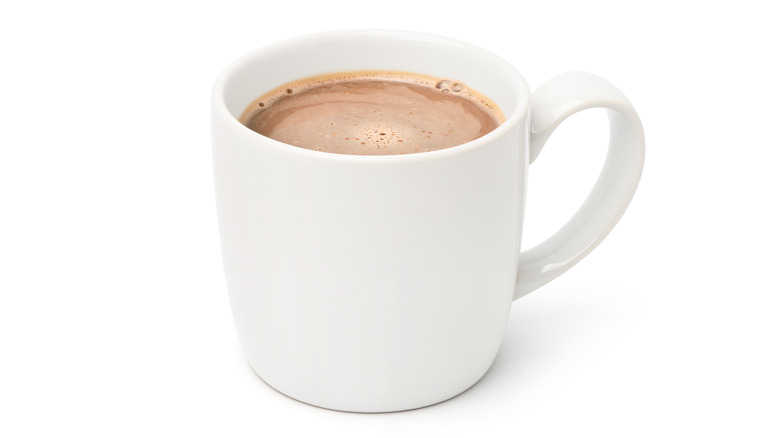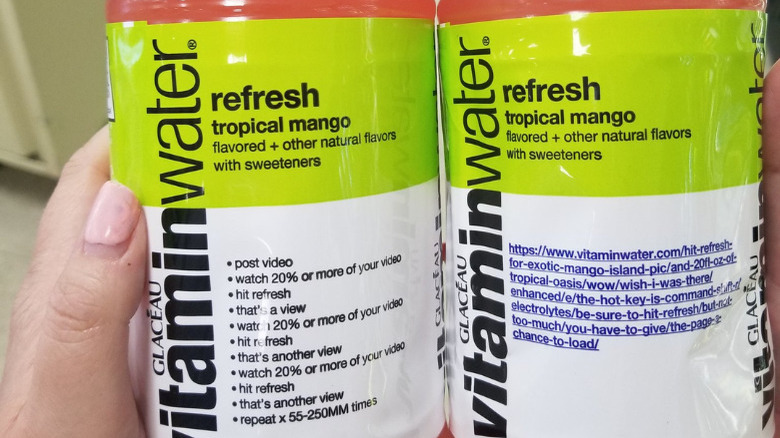14 Gas Station Drinks You Should Think Twice About
Let's face it. Your typical trip to the pump probably has you purchasing a little more than just vehicle fuel. Unfortunately, gas station frequenters are notorious for behaving badly when it comes to pigging out pump-side, and when it comes to choosing drinks, perhaps behave worst of all.
In case you didn't know, gas station drinks often come chock full of unwanted ingredients, but health concerns involving these drinks go far beyond traditional calorie counting. From surprise additives and even unsanitary work practices, there are a few things we think you should know before you take your next sip at the pump.
Does this mean all gas station drinks are going to send you to the hospital? Of course not. Still, you should know that there are a few beverages out there that prove worse than others in the health category. Ready to learn which is which? If so, stay tuned. We're spilling the tea on deliciously risky gas station drinks coming right up.
1. Energy drinks
Energy drinks keep you hydrated and can sometimes offer fun and bubbly flavors. But what's most attractive about energy drinks is the fact that they contain ample amounts of caffeine to help keep you revved throughout the day.
Considering the desirable aspects of energy drinks, you may wonder why we've included them on our list of drinks to think twice about at the gas station. The controversy surrounding these drinks is three-fold. First and foremost, energy drinks contain unsavory ingredients that could adversely affect your health when consumed in excess. These ingredients include sugar, preservatives, and artificial flavorings. Secondly, energy drinks contain very high amounts of caffeine. Depending on the size, you may even see energy drinks containing up to 200mg of caffeine or more.
Lastly, energy drinks are a persuasive option for adolescents and teenagers. With most young people balancing work, school, extra-curricular activities, and sports, energy drinks can be an alluring grab to keep them alert during frenzied parts of the day. Of course, there are better beverage options for people this age. In fact, we're sorry to report that the high caffeine content in energy drinks has sent some people in this age group to the hospital due to over-consumption. Ouch.
2. Tahitian Treat
Does anyone out there remember Tahitian Treat? We certainly do. This signature bright red drink bubbling with gentle fizz marks the minds and memories of lucky ones who grew up in the '90s. Yet despite its popular appeal, Tahitian Treat has a dark side.
If you're lucky enough to spot this ruby rouge drink on gas station shelves, consider giving the label a look over. The drink is chock-full of unwanted additives and detrimental ingredients. For example, the second ingredient in the drink is high fructose corn syrup. As explained by Hartford HealthCare, high fructose corn syrup has been shown to increase the risk of fatty liver disease, weight gain, heart disease, and more. In addition, this fun and fruity drink contains preservatives and artificial flavoring, both of which may cause adverse effects when consumed in excess.
Oh, and let's not forget the reason Tahitian Treat is bright red in the first place. The nostalgic beverage contains Red Dye 40, which the FDA has linked to unwanted altered behaviors in children. And while every child won't exhibit signs of a modified mood after consuming Red Dye 40, it's certainly something parents should to think about before offering this gas station staple to littles.
3. Mello Yello
Ah, Mello Yello. Much like other drinks on the list, Mello Yello invokes memories of chill nights and fun times. It also makes a killer pairing with burgers and pizza! But Mello Yello isn't exactly the healthiest soft drink out there. In fact, this popular gas station drink has quite a few ingredients that should raise a few eyebrows, especially when compared to other beverages in its category.
To start, Mello Yello contains added caffeine, which can be as high as 51mg depending on the size of the drink. And while this isn't an exorbitant amount, drinking multiple cans of Mello Yello could have you feeling quite jittery, especially if you aren't used to consuming a lot of caffeine.
If that's not enough to scare you off, know that although Mello Yello has a hint of orange juice in it, it also contains high fructose corn syrup, preservatives, and Yellow Dye 5. Much like Red Dye 40, Yellow Dye 5 can have adverse effects on some children (via Healthline). In fact, Yellow Dye 5 is accompanied by a warning label in the EU for increasing hyperactivity in children. Thus, once again, this is a gas station drink that should only be sipped in moderation, especially when doling it out to young kids.
4. Slushies
Despite the fact that so many gas stations offer satisfyingly sweet "slushy" drinks, we thought it might be helpful to give a rundown on why this might be a drink option to think twice about.
First off, your typical slushy will contain most of the ingredients we've already warned you about. Sugar, high fructose corn syrup, artificial dyes, artificial flavors ... you get the drift. And though fun flavors like blue raspberry, cherry, and cotton candy are plenty tasty, the ingredients used to make these drinks taste as awesome as they do aren't worth the impact they'll potentially have on your health.
Aside from naughty ingredients, you should also know that slushy machines can often be a notoriously germy place. If not properly cared for, these machines breed mold and bacteria that can make you sick. Therefore, unless you know that gas station employees are diligently cleaning those filthy ice makers, you may want to proceed with caution when purchasing this drink at your local fuel station.
5. Speciality coffees
Most people don't consider the average coffee an unhealthy choice, but the truth is that your local gas station specialty brew could contain surprising ingredients you don't know about.
Take your average French vanilla cappuccino, for example. Many gas stations offer these sweet and velvety coffee drinks, and we must admit, they do a fine job of lifting the mood in the morning. The downside, however, is that these specialty cafe beverages often have a ridiculous amount of sugar. Circle K French Vanilla Cappuccino boasts up to 36 grams of added sugar which is on par with the amount of sugar in a can of Coke . Add this to your daily morning routine and you'll be doing a number on your physical wellness ... and your teeth!
Additionally, you can expect your daily cappuccino or other specialty coffee drink to be high in carbs and calories. Some even contain artificial flavorings, depending on the flavor you choose. At the end of the day, if you really want a boost of caffeine but want to avoid the harmful components of gas station specialty coffees, consider grabbing a cup of black brew instead. Though not quite as appealing as vanilla-flavored joe, it will fare better for your health longterm.
6. Diet soda
With all of the sugar in traditional gas station sodas, you may think the next best option is to choose diet drinks to get your fix. While diet soda may be a good option from time to time, it isn't the best for routine consumption.
The reason you should avoid drinking diet soda regularly is that it's packed with artificial sweeteners. Although there are many artificial sweeteners out there with purported health benefits, there are some that remain better choices than others. What know for certain is that specific sweeteners, such as aspartame and Sucralose, have clinical research that backs up claims related to multiple health risks. As a result, we cannot recommend ingesting diet drinks containing aspartame and Sucralose on a daily basis.
Have ongoing anxiety and depression? Sadly, diet drinks may exasperate that, too. According to research, aspartame increases feelings related to mood disorders. It also has long been linked to cancer and increased risk of developing Alzheimer's, insomnia, and stroke. And though Sucralose was once considered a safe alternative to aspartame, research shows that this isn't always true. In reality, Sucralose can increase risks for leukemia, metabolic dysfunction, and, shockingly, even weight gain.
7. Beer
Gas stations can be great spots to grab a bottle of beer, but doing so too often may spell trouble. Beer is rarely ever consumed on a one-bottle basis, and for this reason, can be easy to over-consume. Even "light" beer can contribute to unsavory outcomes related to weight gain, as people who drink it often believe they can gulp more due to the lower calorie count. In actuality, those calories add up quickly and the excess calorie intake is what often contributes to that unattractive yet oh-so-familiar "beer belly" associated with drinking too much brew.
Aside from the fear of belly fat and weight gain, drinking too much alcohol can also lead to heart disease, cirrhosis of the liver, high blood pressure, stroke, and other terrible health effects. Moreover, downing too many beers can cause you to become dependent on them which can negatively affect you, your loved ones, and overall your quality of life.
If that weren't enough to sway you from grabbing a six-pack with your gas, buying beer at the gas station could be more expensive than picking it up at the liquor or grocery store, depending on where you live.
8. Juice cocktail
What? Juice cocktails are bad for you? Why yes, they certainly are. But the reason juice cocktails aren't recommended for daily consumption may surprise you.
First, let's start off with what a juice "cocktail" actually is. A juice cocktail that isn't labeled 100% juice is actually just juice combined with a variety of yucky additives, similar to what you'd find in your average can of soda. These additives often include added sugar, and yes, high fructose corn syrup.
Remember that most fruit cocktail drinks advertised as being healthy drinks aren't. Thus it is important that you aren't fooled by pictures of fruit on the label. Instead, check the label for sneaky ingredients like artificial coloring, preservatives, and other compounds that could render the drink not so healthy after all. Know also that if you're really craving fruit juice at the gas station, you can always choose juices containing 100% juice. Juices made this way may still be high in natural sugars, but they won't contain added table sugars, high fructose corn syrup, or artificial ingredients.
9. Arizona Green Tea (with ginseng)
Green tea is considered one of the most healthful drinks you can consume in the world. Unfortunately, when it comes to Arizona Green Tea with Ginseng, the popular sip misses the mark.
Arizona Green Tea is known for offering fans a deliciously smooth refreshing flavor without the bitterness commonly associated with green tea beverages. Sadly, it also contains a ton of carbs and, you guessed it, high fructose corn syrup. Because sugar, high fructose corn syrup, and carbs are linked to obesity are linked to obesity, you can expect that drinking too many of these Arizona Green Teas will cancel out any of the typical advantages related to consuming the unsweetened version of the drink.
The nice thing is that while Arizona Green Tea is known for having high fructose corn syrup in its ingredients, there are several other gas station green tea varieties containing no sugar at all. Simply look for the term "unsweetened" on the label, and you'll likely have found the perfect tea for hydration and maybe even a slight energy boost!
10. Mountain Dew
While Mountain Dew reigns supreme in the hearts of countless die-hard soda fans, we're burdened with having to report that this popular citrus-essenced soft drink has landed on our gas station a naughty list.
Known for bright and refreshing flavor coupled with a hearty dose of caffeine, Mountain Dew, when consumed in excess, poses problems to your health. By adding fat to your waistline and cavities to your teeth, Mountain Dew works to wreck your health one sip at a time. That's because the amount of sugar contained in Mountain Dew is generally a bit higher than other soft drinks in its category at 65 grams per bottle.
Other drawbacks to consuming Mountain Dew? You'll likely get the jitters if you kick back too many of them. Mountain Dew contains about 55mg of caffeine per bottle. When drinking multiple cans, you may end up with too much caffeine in your system which may bring about nausea, insomnia, chest pain, and increased anxiety as a result.
11. Gatorade
Gatorade has always had a reputation for providing athletes with the fuel they need to perform at their maximum potential — or at least that's the marketing. That's because Gatorade contains electrolytes known for improving hydration and replenishing essential nutrients lost during exercise. What many don't consider, however, is the fact that Gatorade contains many of the same harmful ingredients that other drinks do, if not more!
From a rainbow assortment of artificial colorings to tons of sugar per serving, Gatorade's negative aspects may outweigh the positive ones. Still, this beloved sports drink often found in local gas stations may benefit those embarking upon rigorous physical activity that'll ensue for more than 1 hour. Planning to be active for less than that? If so, you may wish to skip the Gatorade. Unfortunately, your body won't be able to burn off the sugar and calories you've consumed quickly enough, and the result will be an increased risk of excess weight gain over time.
12. SunnyD
Another memorable and tasty ode to '90s culture, SunnyD is a pleasant-tasting orange-flavored drink that both children and adults love to enjoy. There's no doubt that most who find this drink on gas station shelves flock to it, but those who do so should proceed cautiously.
SunnyD, though refreshing, delicious, and possessing a small amount of nutritious OJ, is also laden with calories, carbs, high fructose corn syrup, and artificial coloring. All of these have adverse effects on human health, but that's not all. Apparently, SunnyD is also in the business of changing the color of human skin.
That's right. News reports in 1999 began to circulate that a child was experiencing color changes after taking too many sips of the drink. Apparently, this was the cause of too much beta-carotene in the girl's system. Still, it's worth noting that not only might SunnyD potentially cause you to veer from your overall health goals, but it could also render your complexion a striking new hue. Who knew?
13. Hot chocolate
Hot chocolate is often deemed a preferable alternative to coffee, and indeed, it can be. Because hot chocolate contains considerably less caffeine, it can sometimes be a more suitable choice for pregnant women, children, and those sensitive to caffeinated beverages. Still, there's no denying that hot chocolate comes with a few downsides, especially when it comes to those served at your local fuel station.
So, what makes snagging a hot chocolate something to think twice about? Though this chocolatey alternative to java is lower in caffeine, it is also overrun with calories, carbs, and unnatural flavorings. Sure, you can make hot chocolate at home using only cocoa powder, sugar, and milk, but this won't be the case for the rich and decadent hot chocolate served pump-side. Instead, this warm and yummy drink is likely to contain artificial flavors and enough sugar to rival a can of soda. Add to that the amount of saturated bad-for-your-heart fat, and you've got a drink well deserving of the stink eye.
14. Vitaminwater
Vitaminwater, often sold at gas stations, does indeed contain a significant number of vitamins and healthy nutrients. Still, too much of a good thing can eventually become a bad thing, and we're saddened to note this might be the case when over-consuming Vitamin Water.
According to a 2019 study, too many micronutrients can lead to disagreeable outcomes. And because people consuming Vitaminwater already absorb nutrients from their daily meals, they can sometimes overdose on vitamins, especially when drinking Vitaminwater on an ongoing basis. The severity and specificity of these outcomes will flex depending on the person and their overall health needs.
Aside from delivering too many nutrients, Vitaminwater surprisingly doesn't do us any favors in the sugar and carb category either. Though marketed as a health drink, Vitaminwater contains a surprising amount of sugar at 27 grams (or more) per 20-ounce bottle. Also, be sure to watch out for tricky phrasing on the label as "crystalline fructose," though natural, is also a sugar compound that can contribute to sundry health effects when ingested in excess.
